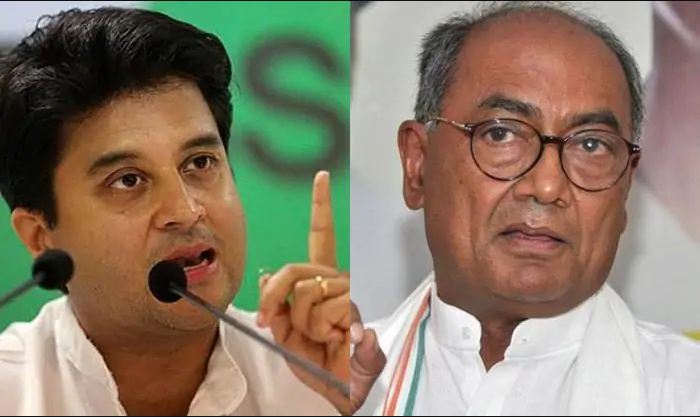From this year onwards, the Congress would remember the festival of Holi as the day when it got debilitated even further after one of its senior leaders decided to quit the party and switch sides to the BJP. Jyotiraditya Scindia’s exit is one of the biggest blows the Congress has suffered in the recent past.
While all political observers and analysts are discussing how the Congress’ strategy of sidelining Jyotiraditya Scindia and allowing the Kamal Nath led ‘old guard’ to prevail is the reason behind the Scindia dynasty getting disenchanted, there is more than what immediately meets the eye.
While the ‘Kamal Nath vs Jyotiraditya Scindia’ tussle and the central leadership’s decision to back its sycophant, Kamal Nath did play a role, there is another issue at play- the age old rivalry between the Raghogarh (Digvijaya’s) and the Gwalior (Jyotiraditya’s) dynasties. This rivalry seems to have again caused a split in the Madhya Pradesh Congress, even as Jyotiraditya Scindia got enticed towards the BJP owing to Digvijaya’s presence in the Congress.
This centuries old rivalry dates back to the eighteenth and nineteenth centuries. To be precise and specific, Jyotiraditya Scindia’s ancestor Daulatrao Scindia had crossed swords with Digvijaya Singh’s ancestor Hindupat Raja Jai Singh in 1802.
The royal dynasty of Gwalior- the Scindias defeated the Raghogarh royal dynasty. Raghogarh became a vassal state of the Gwalior princely state. In fact, Raghogarh princely state used to collect revenues for the Maharaja of Gwalior.
During the days of the British Raj, when all dynasties and princely states got subdued by the British rule, Gwalior was given the status of a 21-gun-salute state. On the other hand, Raghogarh remained a no-gun-salute state.
Cut to the mid twentieth century, Digvijaya Singh’s father Balbhadra Singh became a member of the Hindu Mahasabha. Moreover, he was on good terms with Madhavrao Scindia’s father, Maharaja Jivajirao Scindia.
Opposed to his farher’s allegiance to the Hindu Mahasabha, Digvijaya joined the Congress as the party was the only one that offered political power at that time though his father was on good terms with Rajmata Vijayaraje Scindia, who also wanted Digvijaya Singh to join the Jansangh.
It was matter of chance that even Madhavrao Scindia joined the Congress after starting of as a Jansangh leader. Fast forward to the 90s, Madhavrao Scindia became the frontrunner for the post of Madhya Pradesh Chief Minister after the 1993 Legislative Assembly elections.
Despite Madhavrao’s popularilty and charisma, Digvijaya Singh, a Nehru-Gandhi family sycophant was made the Madhya Pradesh Chief Minister- just like his son got sidelined by another family loyalist Kamal Nath 25 years later.
What is particularly astonishing is that Digvijaya Singh was not even in the race. He had not contested the Assembly polls and was a Parliamentarian when the Assembly poll results were announced. It is widely believed that Digvijaya Singh and Arjun Singh had conspired to keep Madhavrao Scindia away from power.
The centuries old Gwalior-Raghogarh dynasty feud had therefore come to the surface all over again. Digvijaya Singh had won this round against Madhavrao Scindia. Later, Madhavrao Scindia was denied the election ticket for 1996 Lok Sabha polls. He therefore resigned from the Congress and floated his own political outfit- MP Vikas Congress. However, Madhavrao returned to the party fold in the year 1998.
Back to present, after the Congress won the 2018 Madhya Pradesh polls, Jyotiraditya Scindia, a young and dynamic leader was being seen as the frontrunner for the top post in the state.
However, it was another leader from the ‘old guard’, Kamal Nath who prevailed and Scindia was kept completely at the sidelines. While Madhavrao is believed to have been sidelined by Digvijaya in collaboration with Arjun Singh, it seems that Jyotiraditya was jointly snubbed by Digvijaya and Kamal Nath.
Not just Jyotiraditya’s present, the ‘old guard’ was trying to wreck even his future. Not just their own political survival, but Kamal Nath and Digvijaya Singh also wanted to keep Scindia on the sidelines so that they can project sons- Nakul Nath and Jaivardhan Singh as the future of Madhya Pradesh politics.
All these factors clearly weighed heavily on Jyotiraditya Scindia in his decision to quit the Congress and join the BJP. Not just the ongoing political games in Madhya Pradesh, but the context of the centuries old feud between the royal dynasties seems to have created circumstances in this huge political development that has reduced the Congress to rubble in Madhya Pradesh.
